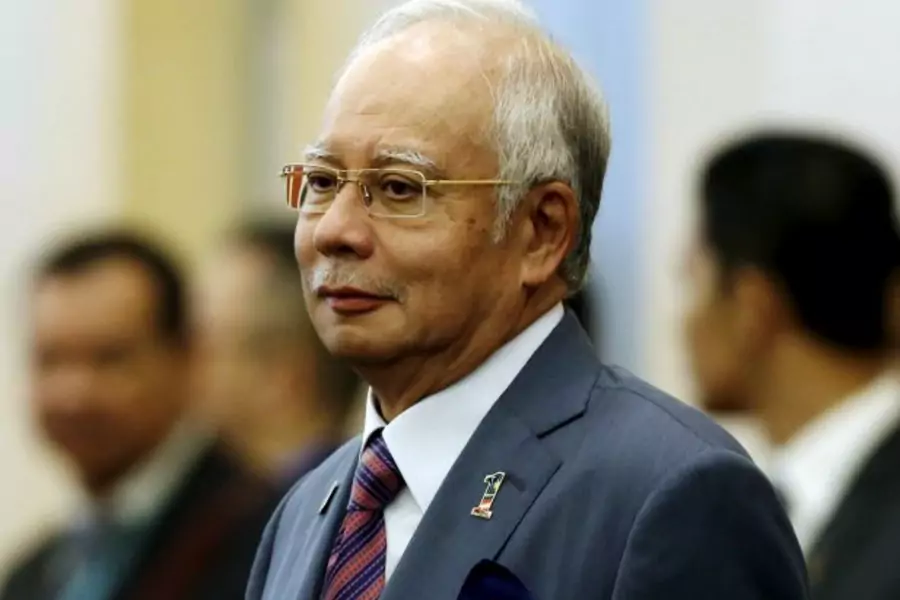More on:
Since early July, when the Wall Street Journal and the Sarawak Report, an investigative website focusing on Malaysia, both reported that embattled Malaysian state fund 1MDB had allegedly transferred funds into the personal accounts of Prime Minister Najib tun Razak, Malaysia’s normally placid politics have exploded. Along with a battle within the ruling coalition between the prime minister and supports of longtime former Prime Minister Mahathir Mohamad, Najib is now apparently fending off challenges from some top leaders within the governing coalition. Even Najib’s own brother, a respected banker, appears to be distancing himself from the prime minister. After Najib’s administration in late July shuttered a Malaysian publication that has published articles investigating 1MDB, Najib’s brother defended the freedom of the local press, implicitly criticizing his brother.
For months, Malaysians have learned---through stories in international publications and an investigation into 1MDB by a group of Malaysian state agencies---about the alleged problems within the state wealth fund. These problems allegedly included theft of monies from the fund for personal use, use of the fund for a string of poor investments, use of the fund to prop up state companies and fund the governing coalition’s campaign, and other irregularities. Mahathir, who either genuinely was appalled by reports of 1MDB’s waste and Najib’s wealth, or wanted to maneuver his own allies into the leadership (or some combination of the two reasons), has for months been attacking Najib online and at public events. In April, Mahathir wrote on his blog, “There are many things about his [Najib’s] personal behavior that I thought were not right … including he and his wife’s lavish lifestyle.”
Still, Najib’s popularity with the public remained relatively strong before the Wall Street Journal and Sarawak Report stories, in part possibly because Malaysians seem to have a high tolerance for government scandals. The country, for instance, ranked 50th in the world on Transparency International’s 2014 Corruption Perceptions Index.
The Journal and Sarawak Report stories, though, were the first to follow the money trail directly to the prime minister and his family. The Journal’s story, using documents that may have been leaked to the media, reported that nearly $700 million in deposits, which allegedly came through 1MDB as well as a holding company in the British Virgin Islands, had been made to personal bank accounts with Najib’s name on them.
The stories of payments into Najib’s personal accounts from 1MDB may be too much for the Malaysian public to stomach, which is why several of the prime minister’s current and former deputies have come out against him in just the past month. For instance, Deputy Prime Minister Muhyiddin Yassin harshly criticized how Najib has handled the 1MDB allegations, and on Malaysian social media, a tidal wave of comments is calling for Najib to resign.
In all likelihood, the threat of a revolt by his own deputies was the reason why, during the last week of July, Najib sacked the Malaysian attorney general and the deputy prime minister, Muhyiddin Yassin---a move that, to Najib’s critics, only solidified their belief that Najib was desperately trying to hide something. Najib replaced the sacked ministers with some of his most loyal supporters. Shortly before the sacking, Asia Sentinel reported, the attorney general, Gani Patail, “was poised to charge Najib with corruption,” which would have been a devastating blow to the prime minister’s future. Meanwhile, Asia Sentinel reported Akhil Bulat, the head of the Special Branch of the Malaysian police, also had become critical of Najib and probably would have gone along with a case against him.
In a move that shocked Malaysians, shortly after the sacking Malaysia’s anti-corruption commission announced that the prime minister had indeed received a payment of nearly $700 million into his personal accounts, but that the money was a donation from a supporter in the Middle East to fund the governing coalition’s political campaigns. Thus, the anti-corruption commission claimed, there was nothing illegal or unusual about the donation. Najib was supposedly holding the money in his personal accounts in trust for his party. The identity of the supposed donor has not been revealed, and many Malaysians were skeptical that the money was either a campaign donation or that it came from a foreign source, rather than from 1MDB. “This claim that Arabs donated billions [to Najib’s campaign] is what people describe as hogwash … Certainly I don’t believe it and neither can the majority of Malaysians," wrote Mahathir on his blog.
For more on Malaysia’s leadership crisis and its implications for Malaysia’s foreign policy, you can read my latest article in World Politics Review.
More on:
 Online Store
Online Store
